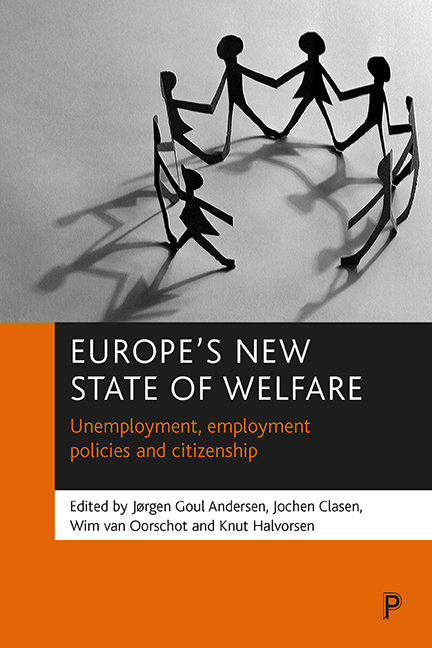Book contents
- Frontmatter
- Contents
- Notes on contributors
- Glossary
- Preface
- one Changing labour markets, unemployment and unemployment policies in a citizenship perspective
- two Employment and unemployment in Europe: overview and new trends
- three Unemployment and unemployment policy in the UK: increasing employability and redefining citizenship
- four To be or not to be employed? Unemployment in a ‘work society’
- five France: the impossible new social compromise?
- six Labour market participation in the Netherlands: trends, policies and outcomes
- seven Is high unemployment due to welfare state protection? Lessons from the Swedish experience
- eight Denmark: from the edge of the abyss to a sustainable welfare state
- nine Unemployment and (un)employment policies in Norway: the case of an affluent but oil-dependent economy: the paradox of plenty?
- ten Unemployment and unemployment policy in Finland
- eleven Slovenia’s navigation through a turbulent transition
- twelve Unemployment and unemployment policy in Switzerland
- thirteen Work, welfare and citizenship: diversity and variation within European (un)employment policy
- References
- Index
- Also available from The Policy Press
eleven - Slovenia’s navigation through a turbulent transition
Published online by Cambridge University Press: 20 January 2022
- Frontmatter
- Contents
- Notes on contributors
- Glossary
- Preface
- one Changing labour markets, unemployment and unemployment policies in a citizenship perspective
- two Employment and unemployment in Europe: overview and new trends
- three Unemployment and unemployment policy in the UK: increasing employability and redefining citizenship
- four To be or not to be employed? Unemployment in a ‘work society’
- five France: the impossible new social compromise?
- six Labour market participation in the Netherlands: trends, policies and outcomes
- seven Is high unemployment due to welfare state protection? Lessons from the Swedish experience
- eight Denmark: from the edge of the abyss to a sustainable welfare state
- nine Unemployment and (un)employment policies in Norway: the case of an affluent but oil-dependent economy: the paradox of plenty?
- ten Unemployment and unemployment policy in Finland
- eleven Slovenia’s navigation through a turbulent transition
- twelve Unemployment and unemployment policy in Switzerland
- thirteen Work, welfare and citizenship: diversity and variation within European (un)employment policy
- References
- Index
- Also available from The Policy Press
Summary
Introduction
Slovenia is a small European country situated between Italy, Austria, Hungary and Croatia, with a population of two million people. It is also one of Europe’s newest countries, and its geographical location and culture are more Central than Southern European. Slovenia only became independent in 1991. The decision to break from the former Yugoslavia involved making a radical break with the past in political and economic terms. In the politics sphere, the transition included:
• a shift from a one-party system to political democracy and a legal state;
• approaching international organisations as an independent state;
• applying for full membership of the EU.
In the economic area, in particular the transition included:
• a shift from a planned to a market economy;
• privatisation in terms of substituting well-defined private owners for the previous ownership of nobody and the state;
• a shift from predominantly internal to external markets.
Several changes started parallel to this and caused the biggest social turbulence in the postwar era. The most important issue was how to navigate the country through the treacherous waters of a crisis in order to open again the doors of prosperity that had been closing before transition started (see Svetlik, 1992; Fink-Hafner and Robins, 1997).
Ten years later, a success story (see also Svetlik, 1998) has unfolded that can be summarised thus:
• Slovenia has been recognised as an independent state and become a member of the most important international organisations, such as the UN and the World Bank (WB). It leads a group of countries set to become new members of the EU.
• Several institutions have been created anew, restructured or abolished in order to put political democracy on firmer grounds. The fourth democratic elections in 2000 gave power to a centre-left coalition.
• Institutional backing of the market economy has been provided. Legal barriers to free entrepreneurship have been removed, and the number of new enterprises has more than tripled. Most prices have been liberalised. The Slovenian currency (tolar) has been made convertible. The deep economic crisis was over in 1993. Gross domestic product (GDP) per capita exceeds $10,000 ($15,000 in purchasing power parity). Investments, productivity and real wages are increasing. However, hard currency reserves that exceeded the debts and the budget deficit that was below 2% in the 1990s have again become problematic. Inflation remains at about 8%.
- Type
- Chapter
- Information
- Europe's New State of WelfareUnemployment, Employment Policies and Citizenship, pp. 195 - 216Publisher: Bristol University PressPrint publication year: 2002
- 1
- Cited by



